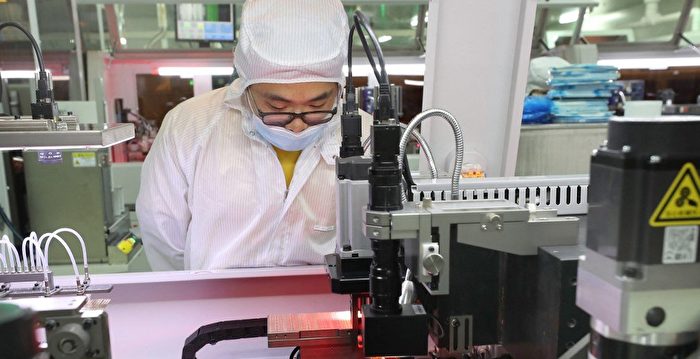[Epoch Times, September 17, 2022](The Epoch Times reporter Chen Ting comprehensive report) China’s chip industry is experiencing a wave of bankruptcies. According to statistics, in the first 8 months of this year, as many as 3,470 chip companies in China went out of business, and the number of bankruptcies hit a record high. new highs. Meanwhile, China’s integrated circuit (IC) production fell 24.7% year-on-year in August, the largest monthly drop on record.
This shows that under the US-China technology war, China’s plan to achieve semiconductor self-sufficiency is facing difficulties.
The South China Morning Post (link) on Thursday (September 15) quoted statistics from China’s business database “Qichacha” which pointed out that between January and August this year, the use of “” 3,470 entities with the term “chips” were written off. That number has surpassed 3,420 in 2021 and 1,397 in 2020.
“The semiconductor industry is a capital-intensive industry,” said Zheng Lei, a visiting professor at the Shenzhen School of Finance at the Chinese University of Hong Kong. Some newly registered chip companies may find it difficult to face fierce competition and a tough market environment. continue to operate.
“South China Morning Post” pointed out that in the past two years, China’s public and private sectors have begun to make large-scale investments in order to achieve the Chinese government’s semiconductor self-sufficiency goal. However, there has been a wave of closures.
A recent string of chip company failures has shown that a sluggish domestic economy in China, sluggish consumption due to lockdowns, and rising tensions between the U.S. and China are all weighing on the semiconductor industry.
On Friday, China’s National Bureau of Statistics released data showing that China’s monthly semiconductor production in August fell by the most on record.
The data shows that IC production fell 24.7% year-on-year last month to 24.7 billion pieces, the largest monthly decline since records began in 1997, and its output was the lowest since October 2020.
It also means China’s semiconductor industry has shrunk for the second month in a row, with production in July down 16.6% year-on-year to 27.2 billion pieces.
In addition, China’s microcomputer production also fell 18.6% to 317.5 billion units in August, the biggest drop since December 2015.
The South China Morning Post said the drop in August reflected continued pressure on China’s manufacturing sector, with the clearing of lockdowns and power shortages caused by heatwaves disrupting factory production and undermining consumer confidence.
In addition to domestic challenges, the U.S. government has begun to impose more restrictions on the export of technology products to protect the United States‘ high-tech advantages.
Last month, the U.S. Commerce Department notified Nvidia and AMD that they must not sell several AI computing chips to China until they have obtained a license. Experts believe that this will greatly impact the CCP’s AI ambitions.
Reuters reported last week that the Biden administration plans to continue to expand restrictions on exports of AI chips to China and impose controls on semiconductor manufacturing tools next month, several people familiar with the matter said.
Once the US government will give notice to individual companies and integrate formal regulations, there will be more comprehensive controls. (understand more)
The sources also said U.S. officials have reached out to allies to ask them to develop similar policies to ensure that foreign companies cannot sell to China technology that U.S. companies are prohibited from exporting.
“The strategy is to contain China, and they’ve found that chips are a choke point. They can’t make these things, they can’t make production equipment,” said James Lewis, a technologist at the Center for Strategic and International Studies. .
Responsible editor: Ye Ziwei#
